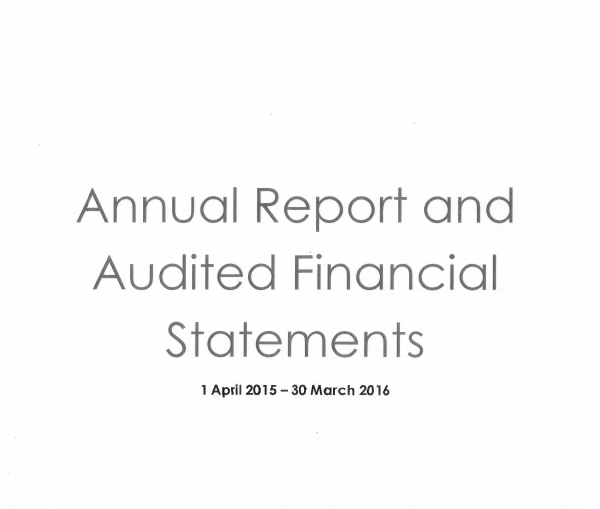Posted on January 5, 2024 by Camille Thirot - Uncategorized

Our vision is a world free from violent conflict. A world where societies undergoing major change manage conflict without violence through dialogue and collaboration.
Our annual report for 2022-2023 reflects on our achievements and the challenges we faced working to build sustainable peace across North Africa, the Western Balkans, Europe and the Swahili Coast region.
Read PCi annual report 2022-2023
Our peacebuilding achievements highlighted in the annual report include:
In Libya, the Social Peace and Local Development project (SPLD):
- continued to support more than 20 Social Peace Partnerships (SPPs) comprising 928+ members who work to promote social cohesion across Libya
- strengthened and enhanced peacebuilding technical skills and knowledge through mentoring and training support delivered in 20 target locations across the country
- supported women’s leadership and a stronger civil society space through six gender grants, and seven grants implemented by civil society organisations, in collaboration with Social Peace Partnerships
- continued to manage conflict issues and tensions in all the target areas across Libya – with some Social Peace Partnerships rolling out initiatives independently of PCi
- strengthened capacity of Tier 2 Social Peace Partnerships (to become Tier 1) through five grants.
In Mozambique, PCi’s work with WeWorld’s team in Cabo Delgado included developing an understanding of conflict dynamics and conflict sensitivity risks in the communities in which WeWorld is working; supporting WeWorld’s project team to prioritise, mitigate and monitor these risks using our conflict sensitive interactions matrix; and developing indicators and tools for measuring the project’s impact on social cohesion.
In Serbia-Kosovo:
- PCi awarded various institutional grants to support mission-led organisations in Kosovo and Serbia to empower them to pursue the core objectives of their mission to achieve social change within their own societies.
- Through PCi’s consortium partners, grant support has been provided to the Advisory Committees established in eight target municipalities to pursue inclusive and participatory approaches to social services planning.
- Support has been provided for a civil society-led process to undertake a campaign in south
Serbia to inform the Albanian-speaking population of the census process – the lessons learnt from the census in Serbia will be applied to the census in Kosovo in 2023.
- PCi has commissioned work to build and train a network of civil society organisations and media outlets with knowledge about the specific challenges.
- PCi designed and established a first-of-its-kind initiative to support collaboration between different language media outlets in Kosovo.
- The Kosovo–Serbia Rapid Response Mechanism (KSRRM) adopted a number of joint positions
which were widely distributed in local media in Kosovo and Serbia, and amongst members of
civil society and the international community.
In Switzerland, PCi engaged with the UN-led peace negotiation processes concerning Syria by providing support to the political opposition delegation representation in Geneva. No activities took place inside Syria.
PCi also maintained contacts with different stakeholders in the South Caucasus and in the Ukraine.
Download PCi annual report 2022-2023
Posted on January 26, 2023 by Camille Thirot - Uncategorized
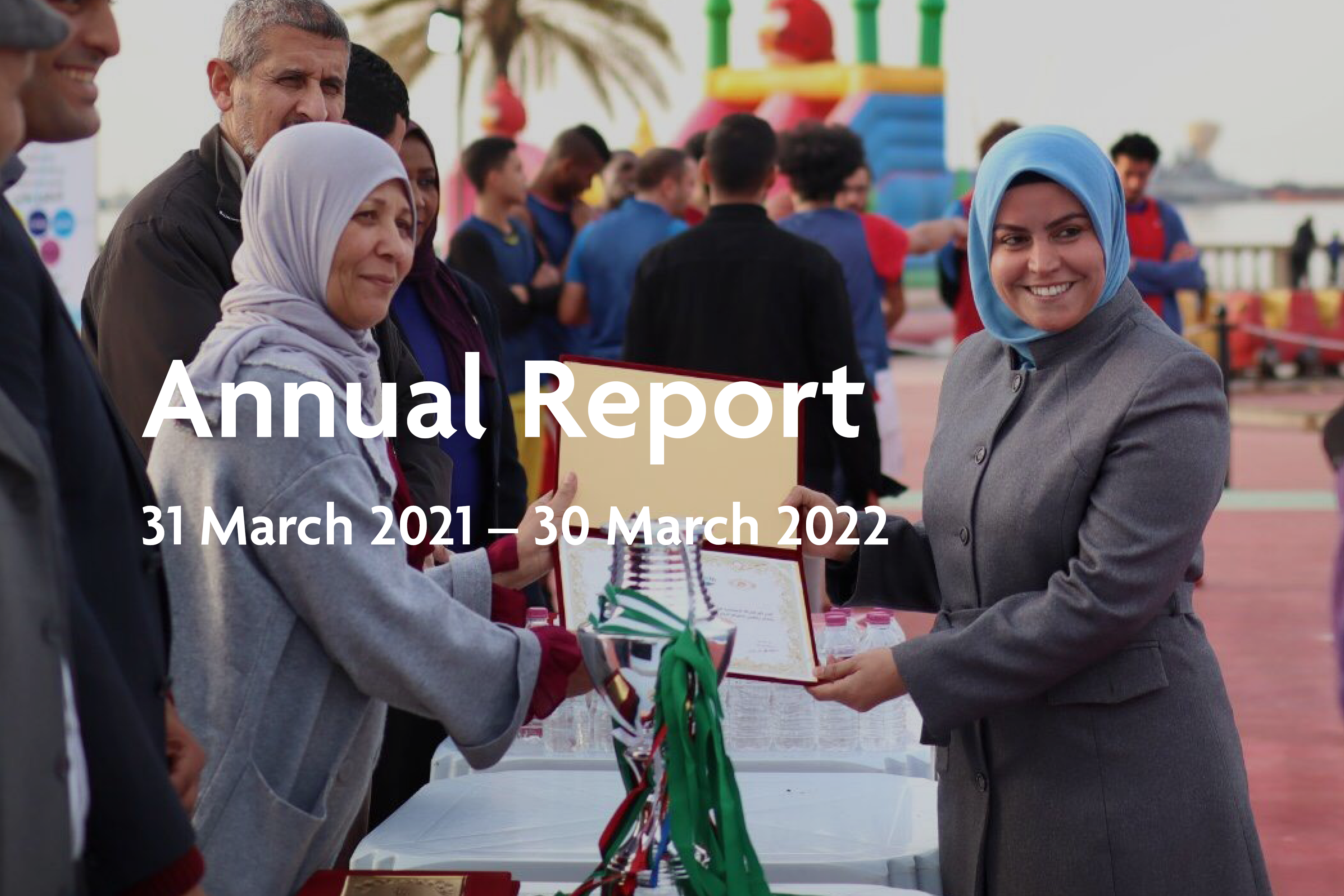
Our latest annual report reflects on some of the achievements we had but also on the challenges we faced building peace in the last year.
With programmes in North Africa (Libya), Western Balkans (Serbia-Kosovo) and Europe/Switzerland (Syria) we also maintained contacts with different stakeholders in Ukraine and the South Caucasus. Our work in the year is detailed in our Annual Report, below, alongside our financial statements. Our key charitable programme activities in the year are highlighted below.
In Libya, through the Social Peace and Local Development Project (SPLD), we:
- Continued to support more than 20 Social Peace Partnerships (SPPs) comprising 563 members, strengthening social cohesion across Libya;
- Deepened the development of a cadre of 20 peacebuilding professionals who provide support to the SPPs as well as disseminating the SPLD approach;
- Strengthened the approach to women, peace and security through implementation of a new project component focused on gender in six municipalities;
- Created Livelihood opportunities through a new project component that addressed economic stressors, including conflict and COVID-19, that negatively impact on community relations, gender equality and social inclusion;
- Supported a network of 36 peacebuilding practitioners who carry out peace actions involving 26 communities across the country.
In Serbia-Kosovo, our key achievements included:
- Five Media Consultation Dialogues brought together media professionals from Serbia and Kosovo to work to end divisive narratives;
- A Rapid Response mechanism was established in Kosovo to assess the impact of COVID-19 on non-majority communities, to support an advocacy strategy and increase awareness amongst government stakeholders on challenges facing these communities.
In Switzerland, we engaged with the UN-led peace negotiation processes concerning Syria by providing capacity-building support to the political opposition delegation representation in Geneva. No activities took place inside Syria.
Download the Annual Report and Audited Financial Statements (31 March 2021-30 March 2022) here.
Posted on January 31, 2022 by Alex Williams - Uncategorized
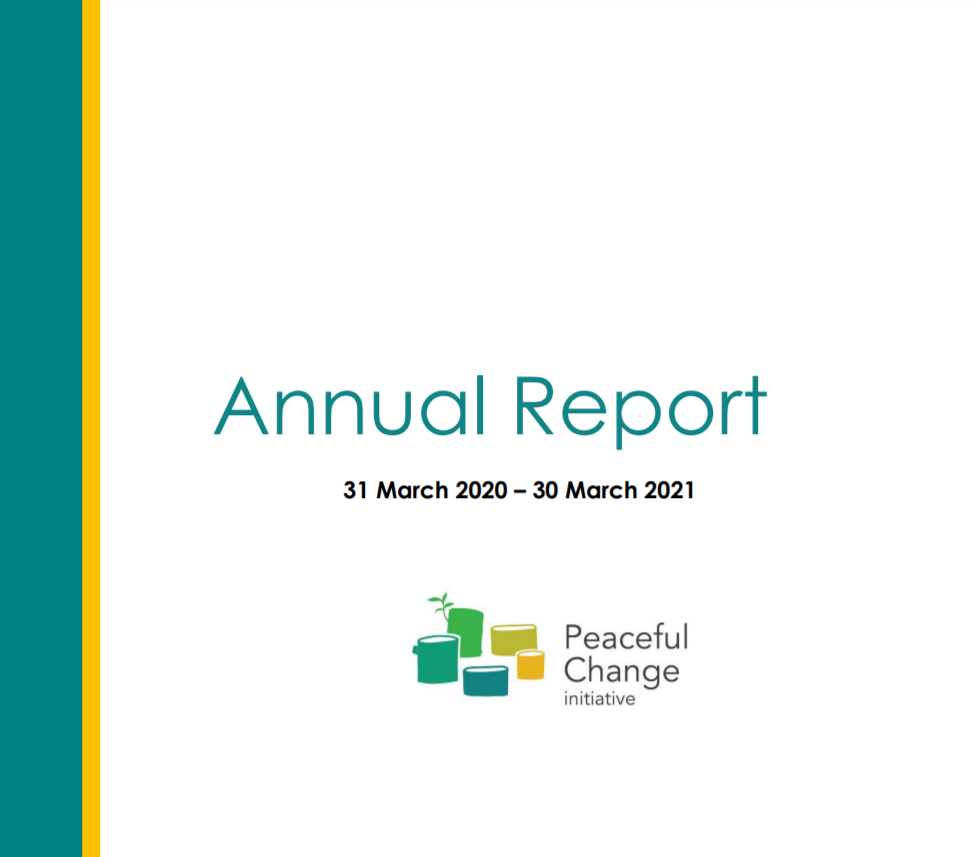
Our work in the year is detailed in our Trustees’ Report, below, alongside our financial statements. Key charitable programme activities in the year were:
Continued delivery for our Libya projects, which now sees the social peace model adopted across 40 towns in the country. In the reporting period we have had a particular focus on combating hate speech which has arisen between different ethnic groups in Libya as a result of the COVID-19 pandemic.
Working with partner organisations in Serbia and Kosovo to amplify local voices, especially those of marginalised groups, in support of equitable development. PCi’s own particular contribution has been to work with media organisations in both countries to address the way in which conflictual narratives are perpetuated.
Support to schools in conflict-affected parts of Georgia, Abkhazia to maintain education during COVID-19 disruptions. PCi facilitated the sharing of experiences between teachers across conflict divides on how to address challenges to education posed by the pandemic.
Download Peaceful Change initiative Annual Report and Audited Financial Statements 31 March 2020-30 March 2021 here
Posted on January 11, 2021 by Alex Williams - Uncategorized
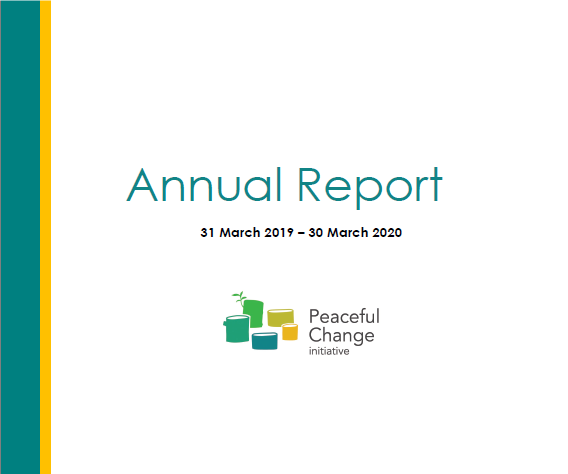
Our work in the year is detailed in our Trustees’ Report, below, alongside our financial statements. Key charitable programme activities in the year were:
i) Continued delivery for our Libya programmes across a number of governmental and institutional donors.
ii) Completed a 12-month Armenia project that improved awareness and knowledge among youth of their role in peace and security issues, and promoted youth participation in decision making and peacebuilding activities.
iii) Commenced work on a 24-month Serbia-Kosovo project, working with partners to amplify local voices, especially those of marginalised groups, in support of equitable development.
Download Peaceful Change initiative Annual Report and Audited Financial Statements 31 March 2019 – 30 March 2020 here
Posted on November 7, 2016 by Alex Williams - Uncategorized
Posted on November 7, 2017 by Alex Williams - Uncategorized
Posted on November 7, 2018 by Alex Williams - Uncategorized

Our work in the year is detailed in our trustees report below alongside our financial statements. Two objectives have been to build resilience in fundraising and grow our expertise and we are pleased to report that we supported 10 separate donors across 15 programmes in the year. We also met our goal to build six months of operating costs as financial reserves and carry a healthy cash balance.
In brief our programme highlights are;
In Libya, PCi has delivered actions that contribute to local peace, development, and stabilisation through the 14 Social Peace Partnerships supporting conflict management at the sub-national level and through the Peacebuilding Network supporting a Network of 44 Libyan peacebuilding practitioners from 26 communities across the country. A number of Social Peace Partnerships have also played an important role as consultative and conflict sensitivity mechanisms to support the implementation of UNDP’s ‘Strengthening Local Capacities for Resilience and Recovery’ and ‘Stabilisation Facility for Libya’ interventions.
In Syria, PCi has delivered actions to strengthen the capacity of a group of Syrian youth in transformational leadership skills and how to apply these across conflict lines. In addition PCi has facilitated a Conflict-Sensitive Assistance for Syria retreat in November 2017 (and April 2018) and subsequently published a report on the Conflict-Sensitive Assistance for Syria Retreat in April 2018.
In Ukraine, PCi has worked with civil society organisations working along the line between Government and Rebel-controlled Ukraine to build their skills as dialogue facilitators and accompanied community groups to deal with practical issues in constructive ways. At the international level PCi has commissioned research and convened discussions to inform the international response to the crisis in Ukraine and how assistance can contribute to addressing underlying drivers of conflict.
On the organisation front we have recruited to strengthen our capability in finance and operations, communications and expanded our outsourced services for managing Human Resources and Payroll. Looking ahead to 2019 we are aiming to complete a strategy review, an upgrade of Finance capabilities and investment and training for improving our programme and business development frameworks.
Download Annual Report and Audited Financial Statements 31 March 2017 – 30 March 2018
Posted on November 7, 2019 by Alex Williams - Uncategorized
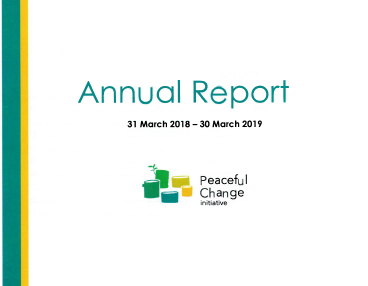
Our work in the year is detailed in our Trustees’ Report, below, alongside our financial statements. Key charitable programme events in the year were:
- Continued delivery for our Libya programmes across a number of governmental and institutional donors;
- Completion of our programmatic work in Syria and the winding down of operations to support this work;
- Development of proposals and operations for the Black Sea region including Ukraine and Armenia.
A decision was taken by the Board in 2018 to wind down all programmes for the Syria region and halt taking on new work. This was due to PCi’s judgement that prevailing operating conditions inside Syria are not conducive to meaningfully deepening the organisation’s work. Also, despite some governmental and institutional interest in our proposals for Ukraine, we were unable to secure new programme work for this country. We remain in communication with donors regarding the delivery of work for 2020 onwards. However, the Board decided to open up programming in Armenia, and PCi successfully fundraised for a new project there.
On the organisation front we continued to refresh and refine our strategy and business planning and improve governance of risk management, and prepared for new financial accounting and reporting systems from April 2020. Our reserves policy for the year was executed as net-neutral in that we neither added to nor deducted from our cumulated reserves; however, we achieved our goal of £250k reserves, which broadly represents 6 months’ operations. A new reserves policy will be set at the AGM in 2019.
Download Peaceful Change initiative Annual Report and Audited Financial Statements 31 March 2018 – 30 March 2019 here





